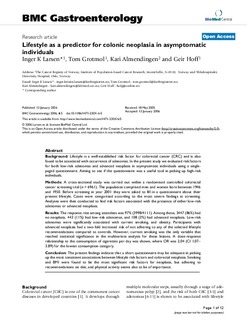Lifestyle as a predictor for colonic neoplasia in asymptomatic individuals
Journal article, Peer reviewed
Permanent lenke
http://hdl.handle.net/11250/2439236Utgivelsesdato
2006-01-13Metadata
Vis full innførselSamlinger
- Gastroenterologi [7]
Originalversjon
Larsen, I. K., Grotmol, T., Almendingen, K., & Hoff, G. (2006). Lifestyle as a predictor for colonic neoplasia in asymptomatic individuals. BMC Gastroenterology, 6(1), Artikkel 5. http://dx.doi.org/10.1186/1471-230X-6-5Sammendrag
BACKGROUND: Lifestyle is a well-established risk factor for colorectal cancer (CRC) and is also found to be associated with occurrence of adenomas. In the present study we evaluated risk factors for both low-risk adenomas and advanced neoplasia in asymptomatic individuals using a single-paged questionnaire. Aiming to see if the questionnaire was a useful tool in picking up high-risk individuals. METHODS: A cross-sectional study was carried out within a randomised controlled colorectal cancer screening trial (n = 6961). The population comprised men and women born between 1946 and 1950. Before screening in year 2001 they were asked to fill in a questionnaire about their present lifestyle. Cases were categorised according to the most severe findings at screening. Analyses were then conducted to find risk factors associated with the presence of either low-risk adenomas or advanced neoplasia. RESULTS: The response rate among attendees was 97% (3998/4111). Among these, 3447 (86%) had no neoplasia, 443 (11%) had low-risk adenomas, and 108 (3%) had advanced neoplasia. Low-risk adenomas were significantly associated with current smoking, and obesity. Participants with advanced neoplasia had a two-fold increased risk of not adhering to any of the selected lifestyle recommendations compared to controls. However, current smoking was the only variable that reached statistical significance in the multivariate analysis for these lesions. A dose-response relationship to the consumption of cigarettes per day was shown, where OR was 2.04 (CI 1.07-3.89) for the lowest consumption category. CONCLUSION: The present findings indicate that a short questionnaire may be adequate in picking up the most consistent associations between lifestyle risk factors and colorectal neoplasia. Smoking and BMI were found to be the most significant risk factors for neoplasia, but adhering to recommendations on diet, and physical activity seems also to be of importance. Denne artikkelen ser på livsstil i forhold til funn av adenomer og cancer påvist ved screening. Styrken i denne studien ligger i at livsstilsdata ble registrert før screening, dvs. før noen visste om det forelå adenomer/cancer eller ikke. Dermed unngikk man vanlig observer bias som begrenser case/control studier på dette. Studien viste at røyking og BMI (kroppsmasseindeks) var sterkest assosiert med forekomst av avansert neoplasi (store adenomer, adenomer med grov dysplasi eller villøse komponenter eller cancer), men det på holde seg til anbefalt kosthold og ikke røyke hadde også betydning.
